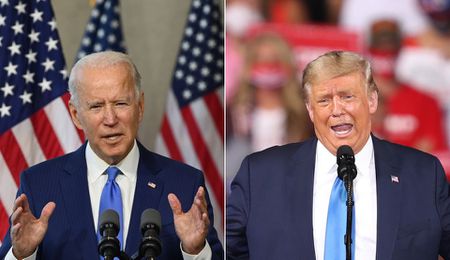THE HUTCHINSON REPORT
By Earl Ofari Hutchinson
Contributing Columnist
The Donald Trump-Joe Biden presidential debates will be good theater but not much more.
I say that not because Trump and Biden have nothing to say, or that the issues aren’t colossal, and how they wouldd deal with them aren’t widely different. But the cold truth is that numerous polls and surveys before and after past presidential debates have confirmed that they don’t change voter preferences.
In 2016, most experts said that Hillary Clinton performed far better than Trump in her answers and approach on the major policy issues. But she still lost the White House.
This year House Speaker Nancy Pelosi thought so little of Biden even bothering to debate Trump that she has repeatedly called for him to scrap debates, since as she put it, Trump is such a liar that it’s impossible to get anything productive out of a debate.
In 1987, former President Richard Nixon had a late life reflection on what went right and wrong in his long and checkered political career. He had this to say about presidential debates: “In the television age, a candidate’s appearance and style count far more than his ideas and record.”
Nixon more than any other presidential candidate in modern times should know about that. The widely held belief is that Nixon’s fidgety, wooden style and unkempt appearance in his first 1960 televised debate with a relaxed, tanned, youthful looking John F. Kennedy did him in.
In their two follow-up debates, though, a much better composed and relaxed Nixon came off as having as good, if not better, command of the issues than Kennedy. His perceived debate loss to Kennedy didn’t finish him.
The probable vote machinations by Democrats in Illinois, a lukewarm, belated endorsement by the wildly popular President Dwight Eisenhower and Nixon’s refusal to phone Martin Luther King Sr. to offer support when Martin Luther King Jr. was jailed for civil rights protests in Georgia badly damaged him.
Kennedy made the call. As a result, Nixon’s vote among blacks dropped nearly 10% from Eisenhower’s in 1956.
Nixon’s alleged debate wash out sealed the belief that an afternoon shadow, mussed hair, a malapropism, and a gaffe during a debate will make or break presidents and their challengers. That’s a myth.
In 1976, President Gerald Ford’s bid for a full elected term supposedly went down the tubes when he blurted out that Poland wasn’t under Soviet domination during his debate with Democratic challenger Jimmy Carter. Presumably, that gaffe shot to pieces Ford’s credibility on vital foreign policy issues.
But Ford could not shake Republican blame for the Watergate scandal, and his pardon of Nixon. That, more than his debate miscue, did him in.
In 1980, it was thought that Republican challenger Ronald Reagan’s carefully scripted and rehearsed “There you go again” retort to Carter when he accused him of wanting to slash Medicare so befuddled Carter that his re-election bid came unglued. But by the time of their debate, Carter’s presidency was badly tattered. Voters blamed him for high inflation, unemployment, waves of business failures and the bungled Iran hostage rescue mission.
In 1988, Democratic presidential contender Michael Dukakis’ automaton-like answer in his debate with Vice President George H.W. Bush to the loaded question about the death penalty supposedly blew his presidential bid. But Bush carried Reagan’s imprimatur. The Reagan administration gave the appearance of fostering an economic boom, had stunning foreign policy successes marked by the collapse of the Soviet Union, and stratospheric public approval ratings.
In his debate with Democratic challenger Bill Clinton in 1992, Bush repeatedly glanced at his watch and seemed impatient to get the debate over. That allegedly soured voters on him. That did not torpedo his re-election bid.
Bush’s inability to resuscitate the economy and urban racial turmoil badly hurt him. What really nailed him was the insurgent campaign of Reform Party presidential candidate Ross Perot. He siphoned off thousands of potential Republican votes.
That cost Bush more than a hundred electoral votes in 13 key Southern and swing states that Republicans had either won during Reagan’s presidential triumphs, or had run strongly in.
In 2000, George W. Bush came off as personable, witty and conversational in his debate with Democrat Al Gore. By contrast, Gore was perceived as stiff, arrogant and condescending.
Yet, many experts believed that despite Gore’s personality glitches, he still beat Bush on the issues. Gore went on to win the popular vote. It took the Florida vote debacle and a Supreme Court ruling to settle the matter for Bush.
Barack Obama won and lost in some debate rounds to first John McCain in 2008 and then Mitt Romney in 2012. However, Obama’s favorables were already high with a wide cross section of voters. So, even his occasional stumbles on camera during the debates, didn’t damage him.
The polarization in American politics today is so wide and deep that even those voters who truly have not made up their minds before the debates and can be influenced by a debate performance have dwindled to almost nothing.
Biden or Trump will win the White House if voters really feel that one can better handle the country’s economic and domestic mess than the other. That won’t come from a presidential debate.
Earl Ofari Hutchinson is an author and political analyst. He is the author of the forthcoming “Why the Electoral College, Not You, Elects Presidents” (Amazon Kindle. He also is a weekly co-host of the Al Sharpton Show on Radio One and the host of the weekly Hutchinson Report on KPFK 90.7 FM Los Angeles and the Pacifica Network.












